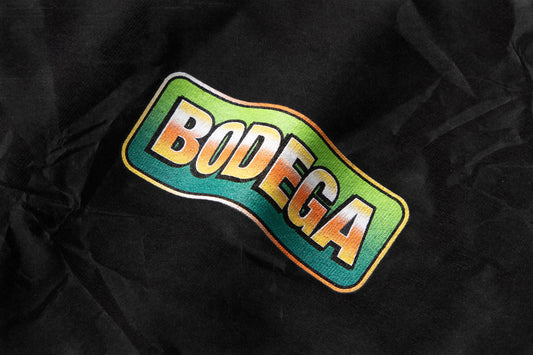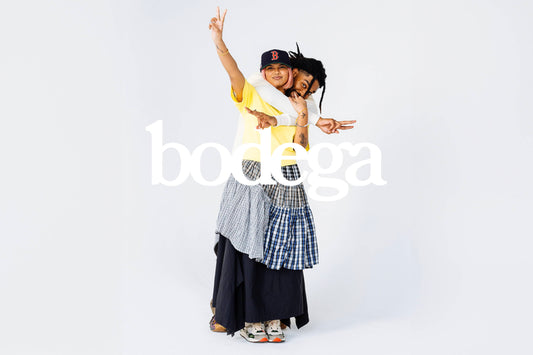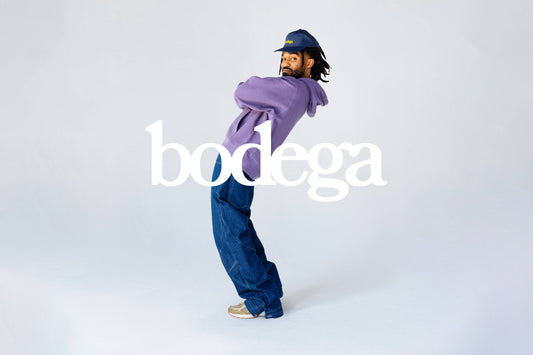Throughout the month of May, we have observed Mental Health Awareness Month, and although we shouldn't limit assessing our mental well-being to just one month out of the year, the dedicated timeframe does give doctors and therapists an opportunity to concentrate their efforts in an open forum that simultaneously helps educate the public while curbing the stigma attached to mental health. Bodega recently caught up with our friend, Licensed Clinical Social Worker and sneakerhead Liz Beecroft to discuss the current climate of mental health and some tips for examining our own state of mind.
Explain your role in the mental health arena?
I’m a Licensed Clinical Social Worker (LCSW for short) where I currently provide individual psychotherapy to Millennials and Gen Z via my private practice MENTL.SESH. My specialty is working with individuals in creative spaces from athletics, fashion, entertainment, and beyond to manage anxiety, depression, trauma, stress and challenging life situations.
To give some background on this process - I have my BS in Psychology from my undergraduate school Susquehanna University and my Masters in Social Work from NYU. After graduating with my MSW I passed my LMSW (Licensed Master Social Work) licensing exam and then in order to obtain my LCSW license I had to gain 3 years of professional clinical experience consisting of over 3000 clinical hours and 100 supervisory hours just to be approved to take that licensing exam, which thankfully I passed and was able to receive my LCSW licensure.
Is it important for someone to experience mental health disorders to help others with them?
Not necessarily - it can definitely help facilitate empathy and a place of understanding, however, mental health isn’t a one size fits all type of thing. So someone who may struggle with one disorder might not always be able to relate to someone else who also struggles from the same disorder since all experiences are unique to the individual. Symptoms also can vary from person to person, with some overlap of course, but this is also part of what makes it really difficult and complicated to understand mental health.
However - experiencing a struggle or decline in your mental health can definitely give insight into what others might be feeling from time to time. It can help increase one’s understanding of awareness and acknowledgment that mental health is definitely something to take seriously.
What made you want to make a life’s work out of it?
I’ve struggled with my own mental health since elementary school - primarily in attachment and separation anxiety. Growing up I experienced panic attacks due to homesickness. As an athlete who attended overnight sleep-away camps for basketball, it made my experience really difficult and I often felt like an outsider since I was the only one on my team visibly experiencing anxiety when I’d have to go away to basketball camp. Luckily my parents took were able to get me started in therapy at a young age where I learned more about what it was that I was experiencing and with time I was able to overcome the panic attacks.
Later in life, I also experienced symptoms of depression and continued anxiety throughout college. I ended up back in therapy to process and learn ways to better manage these symptoms and put some meaning to what I was going through. I’ve been on and off various medications to manage my anxiety and symptoms of depression. I still meet with a therapist weekly to this day because I know in order to be the best version of a therapist for my clients, I need to have that space and outlet for myself each week. Therapy has always and still is a big part of my life - so being able to experience firsthand the positive effects it has had and is having on my life is what lead me to want to pursue a career in this field.
Do you still grapple with mental health?
1000% Every single day. As a therapist, I struggle a lot with opening up about this because I worry any potential clients would feel that I’m not “qualified” to be their therapist because I struggle with anxiety. However, I’m getting better at acknowledging that I am only human and despite being diagnosed with anxiety I’m taking the steps I need to make my day-to-day manageable and do everything in my power to prioritize my mental health for the sake of my career and personal life.
Regardless of having an actual diagnosis or not - at the end of the day each and every single one of us has mental health and should prioritize it the same as we do our physical health. If we don’t - it could lead to a decline in our emotional functioning, similar to how if we don’t take steps to prioritize our physical health it could lead to a decline in our physical functioning.
Has becoming an expert in mental health made you better able to deal with your own issues? Or does it magnify them?
It’s honestly a mixture of both. I still am human - so being an expert definitely doesn’t make me exempt from experiencing uncomfortable feelings the same way being an NBA player doesn’t make any of them exempt from missing shots. I still make mistakes and I definitely still respond out of emotion at times. However being an expert has definitely improved my self-awareness and insight into my own thinking patterns and behavioral patterns, which helps me recognize some of the thoughts, feelings, or behaviors that may not always be helpful in my life and set goals to improve those specific areas.
You are also a very big sneakerhead and basketball fan. Does fashion at all relate to mental health? What about sports? Should there be some sort of more obligation for either?
I definitely feel fashion and sports both relate to mental health. When it comes to fashion there is definitely a correlation, whether it be consciously or subconsciously, between our emotions and the style choices we make each day. From a design perspective, there are quite a few brands out there who pull inspiration from their experiences and feelings as well. Fashion and identity are also so closely related and when it comes to mental health our identity, self-awareness and insight, and core values all play a role in our sense of style and how we choose to dress based on those factors.
As far as sport - when you think of the physical aspects of any game there’s an association with being physically fit. What I don’t think we talk about too often is the components of mental fitness that come into play and how we have to work just as hard mentally to be an athlete. Factors like teamwork, hustle, drive, motivation, work ethic, all stem from our mental health, which results in our performance on the court or field. For professional athletes they also have an obligation to perform. It’s their job - so to be able to create a healthy work/life balance and leave personal life-related stressors out of their ability to play their sport is a skill that one must develop and continue to practice over time.
What trends in mental health are you seeing in younger generations that may be different from your generation or those before you?
When it comes to the younger generations I’m seeing a level of transparency that I definitely didn’t see when I was that age. Gen Z is definitely more proactive in their efforts to raise awareness whether that means sharing their personal stories, supporting one another, sharing resources, etc.. It’s really nice to see this shift. I think these types of conversations are becoming more “normal” given various influences from media coverage, celebrities speaking out, and conversations around treatment being less stigmatized and moreso encouraged.
Obviously the pandemic has put mental health at the forefront of people’s thoughts. People who may not have thought about their mental health before suddenly had to. Would you say there was anything positive that came from the pandemic? Is there a more universal understanding? Or did it magnify the shortcomings that exist? Did the stigma lessen at all?
It’s hard to identify silver linings of this last year due to all of the trauma and loss that we’ve experienced as a nation. However, I do feel that the increase in awareness of mental health can be viewed as a positive because it showed all of us how much important taking care of our mental health is. It definitely was a universal thing - for many people we felt isolated and struggled adjusting to “new normals.” Trying to adapt to what our day to day lives look like forced us all to slow down and become more focused on taking things day by day and prioritizing ourselves, our core values, and bringing what’s really important and impactful to the forefront. There also were times where the shortcomings were magnified, from the access to mental health care to shortage of clinicians, it highlighted some flaws in our system that I truly hope get prioritized to make positive changes. When it comes to stigma I do feel that it lessened. “Mental Health” definitely seemed like a buzzword during the last year and I certainly hope it was for the good with the intention to impact peoples lives for the better by raising awareness, breaking down any stigmas, and letting people know that we can talk about these things and fight through those uncomfortable feelings because chances are others are or have experienced something similar.
What shortcomings do you see in the field and area of study?
One that I am noticing first hand in private practice is accessibility to treatment and services. Not only is it really difficult to find a therapist who is a “good fit.” It’s also confusing for the average person to figure out what therapy model might be the best fit for their needs or even how to find a therapist and the steps you need to take or consider. Finding a therapist (or other treatment option) can be very overwhelming, so much that people either put it off and avoid doing so altogether. However, once you’re able to push past this and take that step toward finding a therapist a lot of people are faced with the financial concerns. Therapy is expensive. For some people who don’t have insurance paying out of pocket for sessions isn’t always feasible. For those with insurance - depending on the plan, some individuals face a similar barrier by having to meet a deductible until their insurance provider will even pay anything toward their sessions. It doesn’t seem fair or ethical to me that mental health care is still so inaccessible for so many people who genuinely need it.
Are there any solutions or steps you’d like to see taken?
I’d like to see our government figure out solutions to make mental health care accessible more widespread. I’d also like to see employers prioritize mental health care in the insurance plans they choose as options for their employees. I’d like to see more marketing for mental health care services and the nonprofits who are doing the work so that people will actually know what is available and how to receive the support they need. I’d like to see more employee benefits that promote mental health care in the workplace.
What is some advice you have for people in the struggle who haven’t turned to anyone for help?
My advice is that there is power in vulnerability. Being honest and open about your emotions or experiences isn’t a weakness, it’s a strength. It’s a way we can grow to become better versions of ourselves and learn how to process these often complicated internal battles. If you’re hesitant on talking to a mental health professional, just start small. Start by opening up and talking to your people, the ones who you feel closest and most connected to. Sometimes just saying things out loud can be helpful to feel as if you’re no longer holding all of that weight on your own.
America has a problem when it comes to health care. What can someone do who doesn’t have the luxury of affording help?
Some steps one can take to find affordable mental health care are:
Inquiring with local social services or nonprofits: community based health centers funded by the government often provide free or low cost mental health services. Nonprofits such as Open Path Collective help match individuals with affordable mental health services and providers that offer sliding scale rates.
NAMI: The National Alliance on Mental Illness has a free 24/7 helpline that offers assistance and advice. You can reach out to them at 1-800-950-6264.
College Students: If you’re in school you can utilize your university’s counseling center to access services at a much less expensive rate than going to meet with a therapist in private practice
Employee Assistance Programs: Some employers offer mental health benefits through EAPs, which are paid for by the employer. Check with your employer to see if this is an option and also ask what your limit of EAP benefits is each year so you have clarity.
Sliding Scale: Some therapist in private practice leave a few slots open on their caseloads to offer sliding scale rates for clients who are not able to financially afford the full cost of sessions. If you’re looking for a therapist, during the consultation process, ask if they offer sliding scale and discuss your options with this therapist to see if anything can be done to assist.
Why is it important to have a Mental Health Awareness Month ?
Mental Health Awareness month is important because it’s a month dedicated to increasing the conversation on mental health. May promotes resources for those who are struggling with their mental health and offers psychoeducation, tools, highlights nonprofits who are doing the work, and really drives transparent conversations. Yes - Mental Health is 24/7 365 but it never hurts to put a little bit more emphasis on it and the hope is that this emphasis encourages these types of conversations and resources to be shared year round.
Any recommended reading or watching?
Books
This is Not A T-Shirt - Bobby Hundreds
The Happiness Trap - Russ Harris
Relentless - Tim Grover
The Body Keeps The Score - Bessel van der Kolk M.D.
Winning the War in Your Mind - Craig Groeschel
Tell us about the "Nike by You" that came out a few years back. What were some of the successes? Any other way sneaker projects, or sports/fashion things on the horizon?
In 2019 I created a sneaker with Nike’s Cultivator Program where I was able to share my story. Going into this I knew that this was a way to not only share my story, merging both my love of sneakers and career as a psychotherapist, but to also raise awareness on mental health, give actionable items as a licensed professional and donate proceeds to The American Foundation for Suicide Prevention. It was an amazing opportunity that I’ll forever be grateful. I’m equally grateful for my own support system who were by my side throughout that entire journey from shooting the lookbook imagery to re-creating the vintage Nike ads, they really had my back and helped make it as impactful as it turned out to be.
I designed an Air Max 270 React and dubbed them the “In My Feels.” I chose the color green (the color of mental health awareness) and a wavy swoosh to represent that fact that healing is not linear and we always have our ups and downs throughout life. The language on the re-created ads shared statistics, resources, and affirmations to educate the community on this topic. My team and I also threw a launch party at Kinfolk in Brooklyn to raise money for AFSP and then donated my entire percentage of earnings as well. When all was said and done I was blown away at the response this shoe had - I didn’t know going into it if it was going to flop or do well - but selling out in under 2 days was a huge success - moreso because it represented that people really do care about this topic of mental health and it goes deeper than just what’s hype.
Following this I had some other opportunities to collaborate with The Hundreds in May of 2020 for Mental Health Awareness Month where 100% of profits was donated to NAMI. I also collaborated with UNKNWN in October of 2020 donating proceeds back to The Jed Foundation. Currently, I’m about to release a collaboration with Staple Pigeon for Mental Health Awareness month and I’m really excited for this one to rollout.
What do you do for relaxation?
I love to play basketball. That’s really a way for me to practice mindfulness and be fully present in the moment. Exercise in general has been so helpful over the last year. Research shows that scientifically it can boost brain chemicals to improve your mood and reduce stress and anxiety. Exercise is a way for me to feel accomplished and to get out of my head and away from anxious thoughts for a brief period of time.
I also really enjoy cooking/baking, binging crappy reality TV, building LEGO, and spending time with friends. All of these bring my genuine happiness and are a way to help my mind be fully present in those moments.







